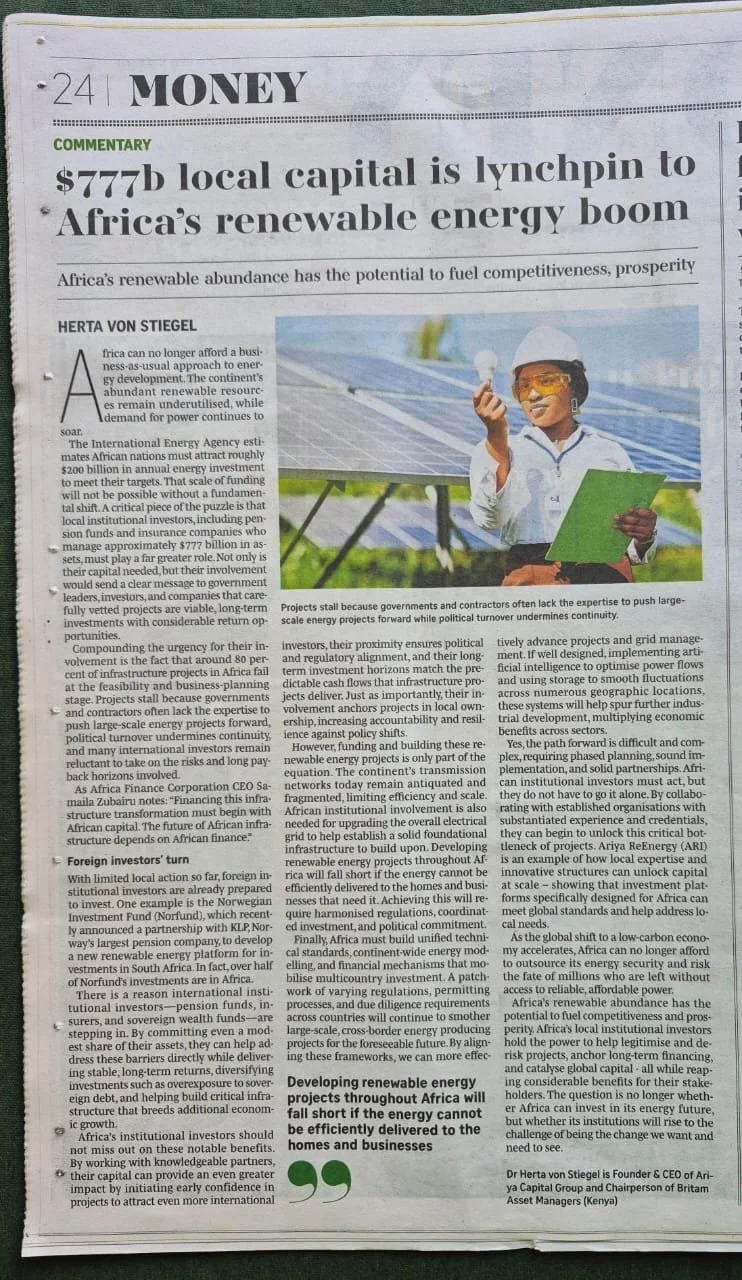New East African Op-Ed: Could this be the key to powering the continent’s clean-energy boom?
New East African Op-Ed: Could this be the key to powering the continent’s clean-energy boom?
Ariya Capital CEO Calls for Mobilising Africa’s Institutional Investors to Drive Renewable Growth
In a new op-ed published by The East African, Dr Herta von Stiegel, Founder and CEO of Ariya Capital Group, highlights the crucial role of Africa’s institutional investors in driving the continent’s clean-energy transition. With over $777 billion in assets under management, Africa’s pension funds and insurers have the power to legitimise and de-risk renewable energy projects while delivering meaningful long-term returns for their stakeholders.
Full Article below or click here to read it in the East African.
Published: 8th October 2025
$777bn In Local Capital is Lynchpin to Launching Africa's Renewable Energy Boom
Africa can no longer afford a “business-as-usual” approach to energy development. The continent’s abundant renewable resources remain underutilized, while demand for power continues to soar. The International Energy Agency estimates African nations must attract roughly $200 billion in annual energy investment to meet their targets (IEA, 2024). That scale of funding will not be possible without a fundamental shift. A critical piece of the puzzle is that local institutional investors, including pension funds and insurance companies who manage approximately US$ 777 billion (AFC, 2025) in assets, must play a far greater role. Not only is their capital needed, but their involvement would send a clear message to government leaders, investors, and companies that carefully vetted projects are viable, long-term investments with considerable return opportunities.
Compounding the urgency for their involvement is the fact that around 80 percent of infrastructure projects in Africa fail at the feasibility and business-planning stage (McKinsey, 2020). Projects stall because governments and contractors often lack the expertise to push large-scale energy projects forward, political turnover undermines continuity, and many international investors remain reluctant to take on the risks and long payback horizons involved. As Africa Finance Corporation CEO Samaila Zubairu notes: “Financing this infrastructure transformation must begin with African capital. The future of African infrastructure depends on African finance” (African Business, 2025).
With limited local action so far, foreign institutional investors are already prepared to invest. Just one example is the Norwegian Investment Fund (Norfund), which recently announced a partnership with KLP, Norway’s largest pension company, to develop a new renewable energy platform for investments in South Africa. In fact, over half of Norfund’s investments are in Africa.
There is a reason why international institutional investors—pension funds, insurers, and sovereign wealth funds—are stepping in. By committing even a modest share of their assets, they can help address these barriers directly while delivering stable, long-term returns, diversifying investments such as overexposure to sovereign debt, and helping build critical infrastructure that breeds additional economic growth.
Africa’s institutional investors should not miss out on these notable benefits. By working with knowledgeable partners, their capital can provide an even greater impact by initiating early confidence in projects to attract even more international investors, their proximity ensures political and regulatory alignment, and their long-term investment horizons match the predictable cash flows that infrastructure projects deliver. Just as importantly, their involvement anchors projects in local ownership, increasing accountability and resilience against policy shifts.
However, funding and building these renewable energy projects is only part of the equation. The continent’s transmission networks today remain antiquated and fragmented, limiting efficiency and scale. African institutional involvement is also needed for upgrading the overall electrical grid to help establish a solid foundational infrastructure to build upon. Developing renewable energy projects throughout Africa will fall short if the energy cannot be efficiently delivered to the homes and businesses that need it. Achieving this will require harmonized regulations, coordinated investment, and political commitment.
Finally, we must also work together to upgrade governance frameworks. Africa must build unified technical standards, continent-wide energy modeling, and financial mechanisms that mobilize multi-country investment. A patchwork of varying regulations, permitting processes, and due diligence requirements across countries will continue to smother large-scale, cross-border energy producing projects for the foreseeable future. By aligning these frameworks, we can more effectively advance projects and grid management. If well designed, implementing artificial intelligence to optimize power flows and using storage to smooth fluctuations across numerous geographic locations, these systems will help spur further industrial development, multiplying economic benefits across sectors.
Yes, the path forward is difficult and complex, requiring phased planning, sound implementation, and solid partnerships. African institutional investors must act, but they do not have to go it alone. By collaborating with established organizations with substantiated experience and credentials, they can begin to unlock this critical bottleneck of projects. Ariya ReEnergy (ARI) is an example of how local expertise and innovative structures can unlock capital at scale – showing that investment platforms specifically designed for Africa can meet global standards and help address local needs.
Time is limited, and the stakes could not be higher. As the global shift to a low-carbon economy accelerates, Africa can no longer afford to outsource its energy security and risk the fate of millions who are left without access to reliable, affordable power.
Africa’s renewable abundance has the potential to fuel competitiveness and prosperity. Africa’s local institutional investors hold the power to help legitimize and de-risk projects, anchor long-term financing, and catalyze global capital - all while reaping considerable benefits for their stakeholders. The question is no longer whether Africa can invest in its energy future, but whether its institutions will rise to the challenge of being the change we want and need to see.





